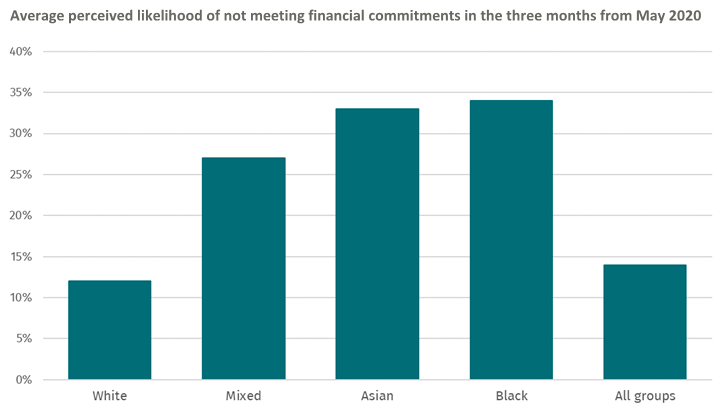Ethnic minorities most at risk from debt due to Covid-19 pandemic

People from black, Asian and other minority ethnic communities are most at risk of financial problems and rising debt caused by the Covid-19 economic crisis, according to new analysis by the IPPR progressive think tank.
They are twice as likely to expect to have difficulty paying their usual bills and expenses in the next three months, and more than twice as likely to have lost their jobs or otherwise stopped paid working during the crisis. They are also 50 per cent more likely to be renters than the wider population, so will have gained less from emergency mortgage holidays and are at greater risk of eviction as a result of rent arrears.
The significantly higher financial impact on ethnic minorities comes on top of the disproportionate health effect of the virus itself on the same communities, with more people likely to be exposed to the virus and a higher proportion likely to become seriously ill or die - creating what IPPR researchers say is a “double whammy”.
The research is part of a wider project on the growth of indebtedness and problem debt across the UK, whose full findings will be published later this year. Drawing on data from a regular survey of UK households and a special survey carried out soon after the first peak of the pandemic, IPPR analysis found:
- People from black, Asian and other minority ethnic communities were more likely to face financial difficulties before the crisis – 12 to 18 per cent reported struggling, compared to 7 per cent across the population as a whole.
- Among borrowers, those from black communities had the highest relative debt levels, with an average equivalent to 18 per cent of their annual gross income, compared to 12 per cent across all groups.
- Among people from all minority ethnic groups who were employed or self-employed at the start of the year, 13 per cent were no longer working in June, compared to 5 per cent of the population generally.
- People of such backgrounds are more likely to rent their homes than the population as a whole – 44 per cent, compared to 28 per cent – with the accompanying risk of eviction for arrears of rent.
- People from minority ethnic communities put their chances of not being able to pay their bills over the three months from June at 27 to 34 per cent on average, compared to 14 per cent across the population.

Chart: Ethnic minorities are more than twice as likely to expect difficulty paying their bills over the next three months
Source: IPPR analysis of Understanding Society Covid Wave 2. “Not meeting financial commitments” refers to individuals saying that they expect to “have difficulty paying their usual bills and expenses”.
New debt crisis
Shreya Nanda, IPPR Economist and an author of the blog report, said:
“Without further intervention we are on course for a new debt crisis, from which black, Asian and other minority ethnic people are particularly at risk. Many in these communities are likely to experience financial difficulty in the months ahead, and to be vulnerable to eviction as a result of rent arrears. Such economic insecurity risks compounding the already disproportionate health impacts borne by people with minority ethnic backgrounds during this crisis - effectively a ‘double whammy’.”
Anna Round, Senior Research Fellow, co-author who is leading the research project, said:
“It’s crucial to understand how vulnerable different groups are to the growing risk of debt as a result of the coronavirus crisis. What this tells us is that people from black, Asian and minority ethnic communities are most exposed to indebtedness, with all the problems that can bring on top of the greater health issues they already face.
“We are now undertaking further research that will enable policymakers to gauge what kind of interventions would best protect these groups, as well as others most vulnerable to the economic effects of the crisis. Action will be needed to prevent minority ethnic communities in particular from falling into a damaging spiral of financial insecurity and problem debt.”
About the IPPR
IPPR is the UK’s pre-eminent progressive think tank. With more than 40 staff in offices in London, Manchester, Newcastle and Edinburgh, IPPR is Britain’s only national think tank with a truly national presence. For further information visit www.ippr.org




